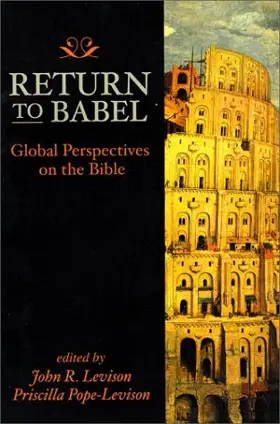

Return to Babel: Global Perspectives on the Bible
Pages
252
Publisher
Westminster John Knox
Published
7/14/2004
ISBN-13
9780664258238
Reviews
Fifteen contributors from Africa, Asia, and Latin America examine five passages from the Old Testament and five from the New from a liberation perspective.
[Full Review]
Louisville: Westminster John Knox, 1999. Pp. xiv + 234, Paperback, $19.00, ISBN 0664258239. Mark McEntire Meredith College Raleigh, NC 27607 This is an astounding collection of thirty essays from fifteen contributors, five each representing Latin America, Africa, and Asia. Well known interpreters such as Elsa Tamez, J. Severino Croatto, Jorge Pixley, Choan-Seng Song, and José Míguez Bonino are joined by a talented group of less familiar writers. The editors have chosen ten pivotal biblical texts for examination: The Tower of Babel (Gen 11:1-9), the Ten Commandments (Exod 20:1-17), Psalm 23, Eccl 3:1-8, the fourth Servant Song (Isa 52:13-53:12), the Beatitudes (Matt 5:1-12), the Prologue to the Gospel of John (John 1:1-18), the story of Pentecost (Acts 2:1-42), 1 Cor 15:1-58, and the vision of the New Jerusalem in Rev 21:1-22:5. Each text is addressed by one reader from each of the three contexts. The logistical complexity of such a project is unimaginable. Little wonder that it took six years. The wisdom of the editors is evident in the rubric so carefully followed by each essay. In all thirty cases, the author establishes a "Context," a cultural backdrop for reading. A second section, "Text," presents the passage in a critically sophisticated, but accessible manner. The "Reflection" then brings the text and context together. The methodology of the writers is appropriately eclectic. Historical-critical influences are obviously present, but the primary focus is typically on the final form of the text. Along with the ideological influences of Marxism and feminism, this diverse collection of interpretive voices brings a vast array of anthropological insights to these texts. Space prevents an individual evaluation of thirty essays, so I will take a more "holistic" approach to the book. The writers consistently position themselves with the poor and oppressed within their cultures. Given this social location, it is all the more amazing that hope is the dominant thread that runs throughout the book.
[Full Review]

